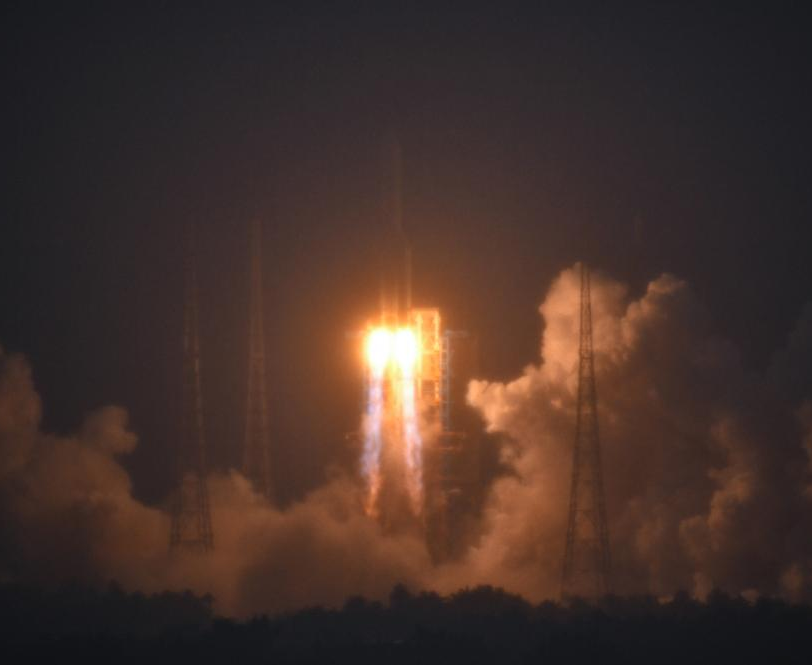——– Initial launch successful, first and second stage ignition achieved
——– IST Committee Member says satellite to reach lunar orbit in 5 days
——– Adds it will circle around the moon for three to six months
——– Launch activity was telecast live on IST’s site and China state TV
From Mahnoor Makhdoom
BEIJING: Pakistan’s space programme achieved a historic milestone on Friday as the country’s first-ever lunar orbiter lifted off from China’s Henan Space Launch Site. The launch of satellite ICUBE-Qamar was telecast live from the Institute of Space Technology’s (IST) website.
The quest to send a lunar orbiter started in 2022 when the China National Space Agency (CNSA), through the Asia Pacific Space Cooperation Organization (APSCO), offered member states an opportunity to send a student-built payload to Earth’s closest celestial neighbour onboard the Chang’e 6 mission.
The ‘ICUBE-Qamar’ (ICUBE-Q) was submitted as a proposal for a lunar CubeSat by the IST. The proposal was selected after an evaluation process.
The development of the payload is a collaborative effort between IST’s students and faculty, SUPARCO and China’s Shanghai Jiao Tong University (SJTU).
The payload consists of three parts, the CubeSat, the separation mechanism, and the mounting bracket. The payload itself weighs around 7kgs. It carries two cameras to take images of the lunar surface and has other sensors and apparatuses for deep-space communication, altitude controls, and other functions.
The primary criteria for mission success will be achieved with the successful separation of the ICUBE-Q CubeSat into lunar orbit from the Chang’e-6 Orbiter. Following ICUBE-Q’s separation, the secondary criteria will involve the satellite receiving the beacon signal, which will confirm that the orbiter is working satisfactorily.
Finally, the orbiter will take pictures of the Earth, and the moon and try to take pictures of at least two objects together (earth, moon, and orbiter).
As part of data collection, ICUBE-Q will also collect data on the lunar magnetic field, establish a lunar magnetic field model, and hopefully, lay the groundwork for future missions and international lunar cooperation.
Prime Minister Shehbaz Sharif on Friday extended heartfelt congratulations to the nation and the scientific community as the country’s first-ever lunar orbiter lifted off, marking a historic milestone in the country’s space programme.
“I-Qube Qamar satellite marks Pakistan’s first step in space. Just as in the nuclear field, our scientists, engineers, and talented individuals are diligently striving in this field,” the premier said.
“I extend my sincere gratitude to the core committee of the Institute of Space Technology, notably Dr Khurram Khurshid, as well as the entire team, including SUPARCO, and particularly the dedicated students who played a pivotal role in this project”
Honouring the deep-rooted ties, the premier said “Pakistan-China friendship has transcended borders from the heights of Himalayas to the depths of the sea, crossing even the boundaries of space”.
“The exclusive acceptance of Pakistan’s project among eight countries stands as a testament to the remarkable abilities of our scientists and experts. This marks a profoundly historic moment in our technological advancement, driving Pakistan into a new era of purposeful space utilization.”
“This achievement will bolster Pakistan’s satellite communication capabilities and pave the way for new opportunities in scientific research, economic development, and national security,” he added.
Shehbaz emphasized the aspiration for Pakistan to achieve economic and technological milestones akin to those witnessed on May 28, 1998, and he underscored Pakistan’s ambition to lead in communication infrastructure, that can potentially open doors to fresh avenues in scientific exploration, economic growth, and safeguarding national security.
The premier concluded by stressing the nation’s commitment to fostering the next generation in these fields to ensure Pakistan’s prominence in global innovation.






